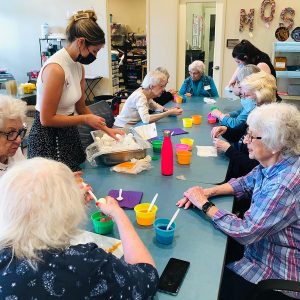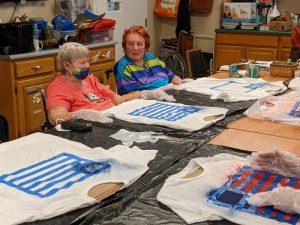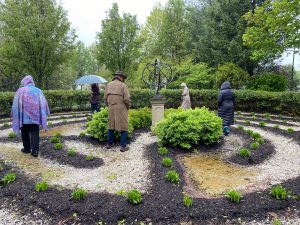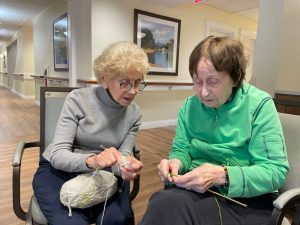Your Brain May Be Declining…
But you still have many options
 Over two-thirds of seniors — in this case meaning people over 65 — will need long-term care in their lifetime. That number may sound surprising. And among those requiring care, an increasing number require specialized memory care (about 10% of those over 70). The next question is, how are those needing this extra level of care identified?
Over two-thirds of seniors — in this case meaning people over 65 — will need long-term care in their lifetime. That number may sound surprising. And among those requiring care, an increasing number require specialized memory care (about 10% of those over 70). The next question is, how are those needing this extra level of care identified?
Perhaps a family member has noticed a change in a loved one’s behavior. Perhaps a phone number has been forgotten. Maybe the person got lost on the way to do the shopping, if only momentarily. They’re laughing about it now, but the second or third time, they become concerned. Enough to raise the issue with a physician.
The doctor may be noncommittal at first. A few questions. A test or two. Those are the first steps.
Waiting for Help
Then more testing. More doctors perhaps. Ultimately, though, the conclusion is that the loved one is in “cognitive decline.” Maybe, the doctors say, early dementia. Mild, but nevertheless real. Not enough to panic. But enough to alert the family. And consider taking action.
At the library — or, more likely, on the Internet — researching begins. Dementia is progressive. It gets worse. Sometimes gradually, sometimes not. The condition can be stalled, scientists say. But it’s ultimately irreversible. The end sounds difficult.
The question becomes, what to do? Where to go for help? What kind of long-term care? What are the options?
Lucky to Live in the 21st Century

The good news is that there are many options today if you or a family member is concerned about dementia. As luck would have it, you’re living about 35 years past the days when physical restraints were commonly used on dementia patients and 60 years since fictional Nurse Ratched handled patient care.
In recent years, there’s been quite a bit of progress on the pharmaceutical front — aducanumab, cholinesterase inhibitors, glutamane regulators and other medications. Though, sadly, there’s still no cure.
Much of the progress has not been medical. For instance, there are many support groups — the Chester County Department of Aging Services can provide a list — and national associations — the Dementia Association of America, Dementia Action Alliance, Alzheimer’s Foundation and others.
In fact, the emphasis in treatment of early dementia is now on the patient’s attitude toward the disease. In other words, by avoiding the “doom and gloom” syndrome, it’s possible to mitigate dementia, at least for a time. Dwelling on the diagnosis will probably make symptoms worse.

Instead, eating healthy, exercising often, getting enough sleep — things we all should all do anyway — will forestall the effects of dementia. Major emphasis is placed on stress management, too. Brain training, taking supplements and medication as prescribed may also help. Doing something purposeful with your life. Maintaining and growing relationships. Staying connected.
And, if dementia is detected early, there’s likely a lot of time left. The Mayo Clinic says Alzheimer’s, a common underlying cause of dementia, can last more than a decade, maybe two or more. But of course, it might not.

In early stages of dementia, the symptoms are benign —a bit of forgetfulness, some confusion, loss of balance.
In the later stages of dementia, the risks and dangers grow. It’s one thing to forget a phone number, another to forget who your spouse is. Confusion is one thing when using the remote for your TV, another if you’re in your car at the entrance to the interstate. Loss of balance can become a fall. Wandering was once a pleasant walk, until you couldn’t find the way home.
When minor inconveniences become serious concerns, choosing a memory care unit (MCU) at one of our senior living facilities or nursing homes may help.
Local Memory Care Options
Today, there are more than 100 memory care units in Chester, Delaware and Lancaster Counties, plus more than 50 in New Castle County, Delaware (See, e.g., MemoryCareFacilities.net). These facilities offer a safe and secure environment, trained staff and peace of mind for you and your loved ones.

The precautions taken typically include supervision, security alarms and frequent safety checks. Some include more subtle interior design elements to improve space recognition, such as unique front doors, doorknobs and color schemes in each household or unit.
Some facilities go further, beyond institutional design. Barclay Friends in West Chester includes five gardens, providing an environment for creativity and socialization. This is called Horticultural Therapy and includes such activities as gardening, flower arranging and enjoying the natural world, indoors and outdoors. Participating residents have entered the Goshen Fair with their work, offering a sense of pride for the whole community.
At Ware Presbyterian in Oxford, music programs, cooking, craft-making and other activities are offered to keep residents’ minds active.
It’s important to realize that for safety reasons, an MCU cannot be an open community. Safety concerns require that the MCU be constantly supervised and monitored. But the good ones will not feel oppressive. They will not feel closed. Far from it. The best MCUs will go to great lengths to respect their residents’ freedom, to let them move, to listen to their preferences, to the extent possible.
MCU Staff’s Role
Rest assured the staff of a good MCU will do its best to help slow cognitive decline. Really good staff may improve the resident’s condition. And they’ll support and maintain connections with family and friends throughout the process.

For example, at Garden Spot Village in New Holland, according to Juanita Fox, its Director of Media Experiences and Storytelling, social workers provide support groups for residents and the community. One of the groups connects people who are noticing cognitive changes in themselves. Another connects their friends and family. And yet another offers encouragement and support for those who are feeling sad, alone, anxious or stressed.
Garden Spot Villagers thrive as they live with purpose. Its residents logged more than 40,000 volunteer hours and were involved in local schools, social service agencies, nonprofit organizations and church communities. Residents lead more than 40 micro-communities on campus, including a wood shop, metal shop, thrift store, community gardens, train room and more. Participants don’t need to be an expert, she says, simply a desire to learn.

At The Hickman, the staff treats residents “with respect and compassion.” Stacey Farrell, its Therapeutic Engagement Specialist, uses a “client-centered approach” to design a daily activity program for residents. She “puts the emotional needs and social well-being of the residents first” and engages them “with an honest open mind, with their interests at heart” devising intervention groups.
These groups involve such things as gardening, art, scenic drives, exercise, discussions, yoga, happy hour — all meant to address the quality of life and provide an “enjoyable and meaningful way to spend their days.” Farrell will use physical exercise, reminiscence therapy and cognitive sensory interventions as well. The activities give residents “a sense of purpose.”

At Tel Hai in Honeybrook, the team members are certified in the “delicate care” of individuals with dementia. Services include 24-hour, resident-centered care by a dementia-trained clinical team, which “discreetly monitors a resident’s safety while retaining their dignity.” The programming is “based on the resident’s cognitive abilities, previous interests and physical needs.”
At Sage Life’s Echo Lake in Malvern, memory care is built on relationships between staff and residents. The staff “serve residents with consistency and familiarity, creating a solid foundation of trust. They share in the residents’ accomplishments and struggles as well as their likes and dislikes … and consider all aspects of each individual’s emotional, social, physical and spiritual needs.”
Wellington Court at Hershey’s Mill features “calming activities, brain health and socialization activities.”
In short, dementia is not a life sentence. With planning and some assistance, it’s possible to still live a full and active life.
